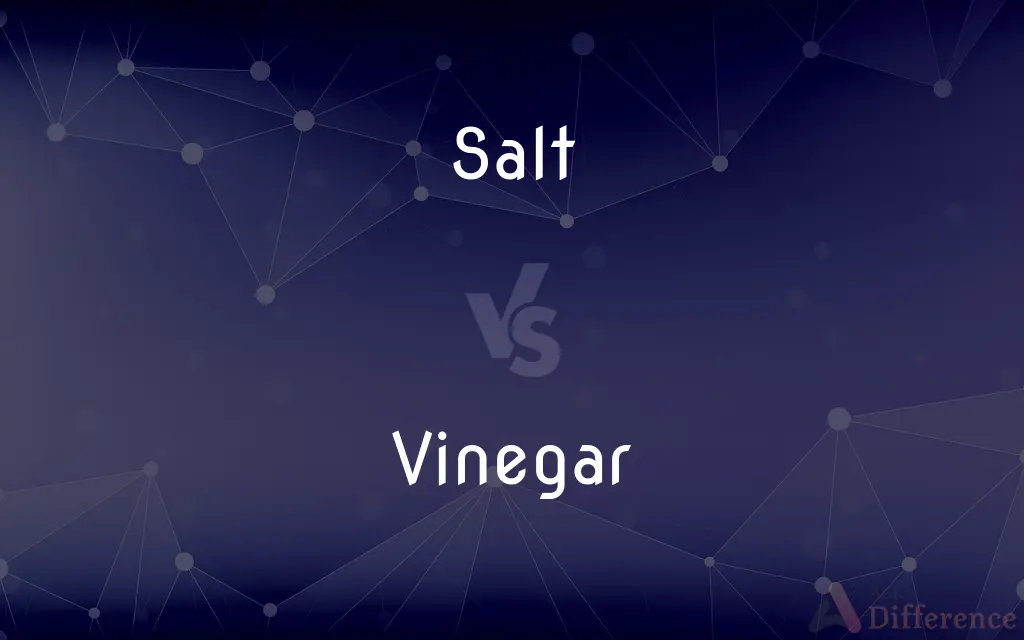Salt vs. Vinegar — What's the Difference?
By Fiza Rafique & Maham Liaqat — Updated on May 15, 2024
Salt is a mineral composed primarily of sodium chloride, used for seasoning and preserving food. Vinegar is an acidic liquid produced through the fermentation of ethanol, used for flavoring, preserving, and as a condiment.

Difference Between Salt and Vinegar
Table of Contents
ADVERTISEMENT
Key Differences
Salt is a crystalline mineral that primarily consists of sodium chloride. It is widely used in cooking to enhance flavor and preserve food. Its granular form makes it easy to sprinkle over dishes or dissolve into liquids. Vinegar, on the other hand, is a liquid composed of acetic acid and water, resulting from the fermentation of ethanol. It is commonly used in cooking for its tangy flavor and as a preservative.
Salt directly affects the flavor by intensifying the taste of food, making it a crucial ingredient in many recipes. Vinegar, while also enhancing flavor, adds acidity to dishes, balancing sweetness and providing a sharp, tangy taste.
Salt is often used in curing and pickling to draw moisture out of food and prevent bacterial growth. Vinegar is also used in pickling and preservation, but its acidic nature acts to kill bacteria and prolong shelf life.
Salt does not undergo significant changes during cooking, retaining its structure and flavor. Vinegar, however, can reduce and concentrate when cooked, intensifying its acidity and flavor.
Comparison Chart
Composition
Sodium chloride
Acetic acid and water
ADVERTISEMENT
Form
Crystalline, granular
Liquid
Uses
Seasoning, preserving, curing
Flavoring, preserving, condiment
Flavor
Salty
Tangy, acidic
Types
Table salt, sea salt, kosher salt
Apple cider vinegar, balsamic vinegar, etc.
Compare with Definitions
Salt
A crystalline mineral primarily composed of sodium chloride.
She added a pinch of salt to the soup.
Vinegar
A condiment known for its tangy flavor and preservative qualities.
Vinegar is essential in making pickles.
Salt
A substance used to season or preserve food.
Salt helps to enhance the flavor of the dish.
Vinegar
A versatile ingredient used in cooking and cleaning.
White vinegar can be used to clean kitchen surfaces.
Salt
An ingredient essential in many culinary processes like baking and brining.
The bread recipe called for a teaspoon of salt.
Vinegar
A liquid that can come in various types with unique flavors.
Balsamic vinegar is a key ingredient in Italian cuisine.
Salt
Salt is a mineral composed primarily of sodium chloride (NaCl), a chemical compound belonging to the larger class of salts; salt in the form of a natural crystalline mineral is known as rock salt or halite. Salt is present in vast quantities in seawater.
Vinegar
An acidic liquid produced by fermenting ethanol.
She uses apple cider vinegar in her salad dressing.
Salt
A usually whitish crystalline solid, chiefly sodium chloride, used extensively in ground or granulated form as a food seasoning and preservative. Also called common salt, table salt.
Vinegar
A solution that has been historically used for medicinal purposes.
Vinegar was used as a disinfectant in ancient times.
Salt
An ionic chemical compound formed by replacing all or part of the hydrogen ions of an acid with metal ions or other cations.
Vinegar
Vinegar is an aqueous solution of acetic acid and trace compounds that may include flavorings. Vinegar typically contains 5–8% acetic acid by volume.
Salt
Salts Any of various mineral salts used as laxatives or cathartics.
Vinegar
A sour liquid containing acetic acid, produced by fermenting a solution (such as wine or fermented rice) containing ethanol produced by a previous fermentation, used as a condiment and preservative.
Salt
Salts Smelling salts.
Vinegar
Sourness of speech or mood; ill temper.
Salt
Often salts Epsom salts.
Vinegar
Liveliness and enthusiasm; vim.
Salt
An element that gives flavor or zest.
Vinegar
(uncountable) A sour liquid formed by the fermentation of alcohol used as a condiment or preservative; a dilute solution of acetic acid.
Salt
Sharp lively wit.
Vinegar
(countable) Any variety of vinegar.
A range of herb-flavoured vinegars
Salt
(Informal) A sailor, especially when old or experienced.
Vinegar
(transitive) To season or otherwise treat with vinegar.
Salt
A saltcellar.
Vinegar
A sour liquid used as a condiment, or as a preservative, and obtained by the spontaneous (acetous) fermentation, or by the artificial oxidation, of wine, cider, beer, or the like.
Salt
Containing or filled with salt
A salt spray.
Salt tears.
Vinegar
Hence, anything sour; - used also metaphorically.
Here's the challenge: . . . I warrant there's vinegar and pepper in't.
Salt
Having a salty taste or smell
Breathed the salt air.
Vinegar
To convert into vinegar; to make like vinegar; to render sour or sharp.
Hoping that he hath vinegared his sensesAs he was bid.
Salt
Preserved in salt or a salt solution
Salt mackerel.
Vinegar
Sour-tasting liquid produced usually by oxidation of the alcohol in wine or cider and used as a condiment or food preservative
Salt
Flooded with seawater.
Vinegar
Dilute acetic acid
Salt
Found in or near such a flooded area
Salt grasses.
Salt
To add, treat, season, or sprinkle with salt.
Salt
To cure or preserve by treating with salt or a salt solution.
Salt
To provide salt for (deer or cattle).
Salt
To add zest or liveliness to
Salt a lecture with anecdotes.
Salt
To give an appearance of value to by fraudulent means, especially to place valuable minerals in (a mine) for the purpose of deceiving.
Salt
A common substance, chemically consisting mainly of sodium chloride (NaCl), used extensively as a condiment and preservative.
Salt
(chemistry) One of the compounds formed from the reaction of an acid with a base, where a positive ion replaces a hydrogen of the acid.
Salt
(uncommon) A salt marsh, a saline marsh at the shore of a sea.
Salt
(slang) A sailor also old salt.
Salt
(cryptography) Randomly chosen bytes added to a plaintext message prior to encrypting or hashing it, in order to render brute-force decryption more difficult.
Salt
A person who seeks employment at a company in order to (once employed by it) help unionize it.
Salt
(obsolete) Flavour; taste; seasoning.
Salt
(obsolete) Piquancy; wit; sense.
Attic salt
Salt
(obsolete) A dish for salt at table; a salt cellar.
Salt
Epsom salts or other salt used as a medicine.
Salt
(figurative) Skepticism and common sense.
Any politician's statements must be taken with a grain of salt, but his need to be taken with a whole shaker of salt.
Salt
(Internet slang) Tears; indignation; outrage; arguing.
There was so much salt in that thread about the poor casting decision.
Salt
The money demanded by Eton schoolboys during the montem.
Salt
One who joins a workplace for the purpose of unionizing it.
Salt
A bounding; a leaping; a prance.
Salt
Salty; salted.
Salt beef;
Salt tears
Salt
Saline.
A salt marsh;
Salt grass
Salt
Related to salt deposits, excavation, processing or use.
A salt mine
The salt factory is a key connecting element in the seawater infrastructure.
Salt
Bitter; sharp; pungent.
Salt
Salacious; lecherous; lustful; (of animals) in heat.
Salt
Costly; expensive.
Salt
(transitive) To add salt to.
To salt fish, beef, or pork; to salt the city streets in the winter
Salt
(intransitive) To deposit salt as a saline solution.
The brine begins to salt.
Salt
To fill with salt between the timbers and planks for the preservation of the timber.
Salt
To insert or inject something into an object to give it properties it would not naturally have.
Salt
(mining) To blast metal into as a portion of a mine in order to cause to appear to be a productive seam.
Salt
(archaeology) To add bogus evidence to an archaeological site.
Salt
(transitive) To add certain chemical elements to (a nuclear weapon) so that it generates more radiation.
Salt
(transitive) To sprinkle throughout.
They salted the document with arcane language.
Salt
(cryptography) To add filler bytes before encrypting, in order to make brute-force decryption more resource-intensive.
Salt
To render a thing useless.
Salt
To sow with salt (of land), symbolizing a curse on its re-inhabitation.
In this place were put to the ground and salted the houses of José Mascarenhas.
Salt
(wiki) To lock a page title so it cannot be created.
Salt
The chloride of sodium, a substance used for seasoning food, for the preservation of meat, etc. It is found native in the earth, and is also produced, by evaporation and crystallization, from sea water and other water impregnated with saline particles.
Salt
Hence, flavor; taste; savor; smack; seasoning.
Though we are justices and doctors and churchmen . . . we have some salt of our youth in us.
Salt
Hence, also, piquancy; wit; sense; as, Attic salt.
Salt
A dish for salt at table; a saltcellar.
I out and bought some things; among others, a dozen of silver salts.
Salt
A sailor; - usually qualified by old.
Around the door are generally to be seen, laughing and gossiping, clusters of old salts.
Salt
The neutral compound formed by the union of an acid and a base; thus, sulphuric acid and iron form the salt sulphate of iron or green vitriol.
Salt
Fig.: That which preserves from corruption or error; that which purifies; a corrective; an antiseptic; also, an allowance or deduction; as, his statements must be taken with a grain of salt.
Ye are the salt of the earth.
Salt
Any mineral salt used as an aperient or cathartic, especially Epsom salts, Rochelle salt, or Glauber's salt.
Salt
Marshes flooded by the tide.
His fashion is not to take knowledge of him that is beneath him in clothes. He never drinks below the salt.
Salt
The act of leaping or jumping; a leap.
Salt
Of or relating to salt; abounding in, or containing, salt; prepared or preserved with, or tasting of, salt; salted; as, salt beef; salt water.
Salt
Overflowed with, or growing in, salt water; as, a salt marsh; salt grass.
Salt
Fig.: Bitter; sharp; pungent.
I have a salt and sorry rheum offends me.
Salt
Fig.: Salacious; lecherous; lustful.
Mine eyes are full of tears, I can not see;And yet salt water blinds them not so muchBut they can see a sort of traitors here.
Salt
To sprinkle, impregnate, or season with salt; to preserve with salt or in brine; to supply with salt; as, to salt fish, beef, or pork; to salt cattle.
Salt
To fill with salt between the timbers and planks, as a ship, for the preservation of the timber.
Salt
To deposit salt as a saline solution; as, the brine begins to salt.
Salt
A compound formed by replacing hydrogen in an acid by a metal (or a radical that acts like a metal)
Salt
White crystalline form of especially sodium chloride used to season and preserve food
Salt
Negotiations between the United States and the Union of Soviet Socialist Republics opened in 1969 in Helsinki designed to limit both countries' stock of nuclear weapons
Salt
The taste experience when salt is taken into the mouth
Salt
Add salt to
Salt
Sprinkle as if with salt;
The rebels had salted the fields with mines and traps
Salt
Add zest or liveliness to;
She salts her lectures with jokes
Salt
Preserve with salt;
People used to salt meats on ships
Salt
Containing or filled with salt;
Salt water
Salt
Of speech that is painful or bitter;
Salt scorn
A salt apology
Salt
One of the four basic taste sensations; like the taste of sea water
Salt
A term often used metaphorically to describe something adding value or interest.
He is the salt of the earth.
Salt
A compound that can form through the reaction of an acid with a base.
Salt crystals formed at the bottom of the solution.
Common Curiosities
Does salt dissolve in water?
Yes, salt easily dissolves in water, making it a versatile seasoning.
Can salt be used for preservation?
Yes, salt is often used to preserve meats and other foods by drawing out moisture.
Is vinegar used in pickling?
Yes, vinegar's acidity makes it ideal for pickling and preserving various foods.
Is salt essential for baking?
Yes, salt is essential in baking to enhance flavor and control yeast fermentation.
Can vinegar be used for cleaning?
Yes, vinegar, especially white vinegar, is commonly used for household cleaning due to its acidity.
What is salt made from?
Salt is made from sodium chloride, a mineral commonly found in seawater.
How is vinegar produced?
Vinegar is produced by fermenting ethanol with acetic acid bacteria.
What types of salt are there?
There are various types, including table salt, sea salt, and kosher salt.
Can salt improve food texture?
Yes, salt can improve the texture of foods, such as making meat more tender in brining.
Can vinegar aid in digestion?
Yes, some types of vinegar, like apple cider vinegar, are believed to aid in digestion.
How does vinegar enhance flavor?
Vinegar enhances flavor by adding acidity, balancing sweetness, and providing a tangy taste.
Is vinegar safe to consume daily?
Yes, in moderate amounts, vinegar is safe to consume and can have health benefits.
What are the different types of vinegar?
Types include apple cider vinegar, white vinegar, balsamic vinegar, and more.
What is the primary flavor of salt?
The primary flavor of salt is salty, enhancing the taste of food.
Does salt affect blood pressure?
Excessive salt intake can contribute to high blood pressure in some individuals.
Share Your Discovery

Previous Comparison
Couple vs. Item
Next Comparison
Image vs. ReflectionAuthor Spotlight
Written by
Fiza RafiqueFiza Rafique is a skilled content writer at AskDifference.com, where she meticulously refines and enhances written pieces. Drawing from her vast editorial expertise, Fiza ensures clarity, accuracy, and precision in every article. Passionate about language, she continually seeks to elevate the quality of content for readers worldwide.
Co-written by
Maham Liaqat















































